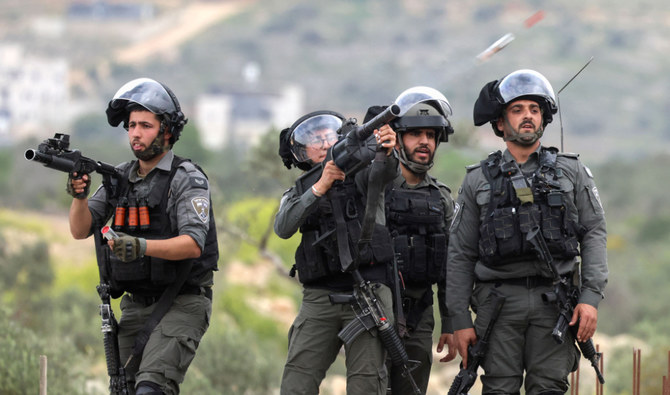RAMALLAH: Israeli forces killed a 15-year-old Palestinian boy on Monday in a raid on a West Bank camp, amid wider clashes during a settler march and a mass intrusion into the grounds of Al-Aqsa Mosque.
Palestinian medical sources said Mohammed Balhan was killed as Israeli forces stormed the Aqabat Jaber near Jericho in the West Bank. Balhan was hit with three bullets to the head, abdomen and pelvis during clashes.
Two other civilians suffered bullet wounds to their lower bodies and five other civilians were arrested.
The Israeli army has killed 96 Palestinians in the West Bank this year, seven of whom were from Jericho. More than 100 Palestinians have been arrested in that time.
His death came amid reports that 191 Palestinians were injured during clashes with Israeli forces around Mount Abu Sbeih near Beita, south of Nablus, as residents staged a counter-protest against a march by thousands of Israeli settlers attempting to reclaim the nearby abandoned hilltop outpost known as “Avitar.”
The march, from the Za’tara checkpoint, was protected by a battalion-sized Israeli force and led by seven government ministers including National Security Minister Itamar Ben Gvir and Finance Minister Bezalel Smotrich. More than a dozen other members of the Knesset took part.
The settlers demanded the legalization of Avitar, which was initially established in 2013 and finally evacuated by Supreme Court order last year following repeated bouts of violence in which 12 Palestinians were killed and thousands injured.
Israeli media reported that some marchers have vowed to take and remain on the site to “impose a reality on the ground.”
Mahmoud Barham, mayor of Beita, told Arab News that hundreds of residents confronted the Israeli army.
Barham, whose brother was killed in previous clashes over Avitar, said that the presence of Israeli ministers, MPs and settlement leaders was designed to send a message that Israel was determined to control the area.
“We are ready to confront and resist and to start a new round of popular resistance against them,” he told Arab News. “We were and will remain guards of Mount Abu Sbeih, even if the number of martyrs, wounded and prisoners among us doubles.”
Ghassan Daghlas, responsible for the settlement file in the northern West Bank of the Palestinian Presidency, told Arab News that the march aimed to legitimize the theft of Palestinian lands.
“We are facing a new settlement battle with this extreme right-wing Israeli government,” he said. “If their policies are not met with a strong Palestinian and international popular response, they will reactivate settlements in the northern West Bank and rebuild the settlements that were evacuated in 2005.”
Meanwhile, more than 1,500 settlers guarded by Israeli police stormed Al-Aqsa Mosque on the fifth day of the Jewish Passover holiday.
The Islamic Awqaf Department said the numbers were higher than the incursions before Passover. Hundreds of Palestinians and Turks were present in Al-Aqsa’s squares during the incursion, it added.
Hamas spokesman Abdel Latif Al-Qanou said that both incidents showed Israel’s aggression and push to Judaize Palestinian land and sanctities. He called on Palestinians to resist what he described as a fascist occupation government.
Palestinian Prime Minister Mohammed Shtayyeh said that the Israeli government must be held accountable for its daily crimes, the aggression at Al-Aqsa, the pro-settlement march of ministers and Knesset members, and the invasions that have led to the deaths of many Palestinians such as Mohammed Balhan in Jericho on Monday.
In Hebron, Israeli forces closed the Bab Al-Zawiya area and Beersheba Street in the city center in preparation for a settler march, forcing store owners to shut their businesses and preventing shoppers preparing for Eid in Al-Shuhada Street and the Tal Rumeida area.
The Israeli authorities still prevent citizens and visitors from reaching the Ibrahimi Mosque to perform prayers there under the pretext of the settlers’ celebration of their Jewish holiday.


























